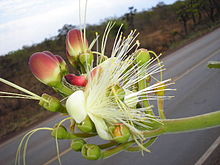Caryocar
| souari trees | |
|---|---|
 |
|
| Pekea-nut (Caryocar nuciferum) | |
 |
|
| Caryocar brasiliense | |
| Scientific classification | |
| Kingdom: | Plantae |
| (unranked): | Angiosperms |
| (unranked): | Eudicots |
| (unranked): | Rosids |
| Order: | Malpighiales |
| Family: | Caryocaraceae |
| Genus: |
Caryocar F.Allam. ex L. |
| Synonyms | |
|
|
Caryocar (souari trees) is a genus of flowering plants, in the South American family Caryocaraceae described as a genus by Linnaeus in 1771. It is native primarily to South America with a few species extending into Central America and the West Indies.
Caryocar consists of trees that yield a strong timber. Some of the species within the genus Caryocar have edible fruits, called souari-nuts or sawarri-nuts. The most well-known species is probably the Pekea-nut (C. nuciferum). In Brazil the Pequi (C. brasiliense) is most popular; it has a variety of uses, not the least among them being the production of pequi oil. Furthermore, some species are used by indigenous peoples to produce poisons for hunting.
...
Wikipedia
